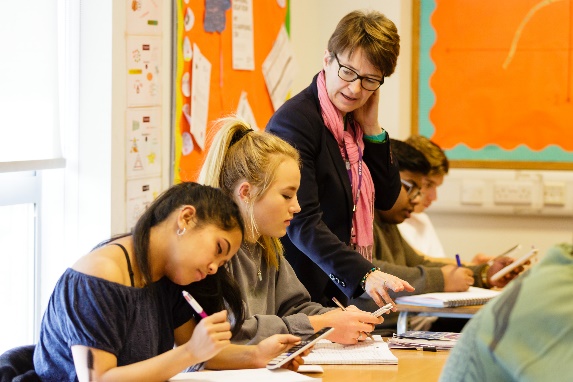Mathematical Thinking for GCSE (Year 2 extension for schools that participated previously) - Online
Dates: To be confirmed

The stated aims of the KS4 Programme of Study are that, through working on the content, pupils should develop mathematical fluency, mathematical reasoning and problem solving. While mathematical thinking is a key feature of all of these, the focus of this Work Group is to support teachers in developing their understanding of mathematical thinking as it relates to problem-solving and reasoning, using practical task types to explore what it means for pupils to get better at mathematical thinking and what this looks like in the classroom.
This extends the Mathematical Thinking Work Group into a second year in which participants deepen their understanding of mathematical thinking and further develop strategies and structures to support it in the classroom. Professional development activities will focus on practical and accessible classroom-based approaches.

Exam boards often note that, when pupils come to GCSE examinations, AO2 and AO3 are frequently poorly addressed. This Work Group is designed to meet teachers’ needs in that it offers both practical and theoretical elements to address a key concern (GCSE attainment), while offering a manageable structure for collaborative CPD (the Work Group):
1. To offer teachers support so that they are better equipped to help all pupils develop their mathematical thinking, ultimately preparing them for the challenges of the GCSE and beyond
2. To support teachers in understanding and using participation in a Work Group as the basis of collaborative continued professional development for themselves and within their department.
Mathematical Thinking is one of the Five Big Ideas for Teaching for Mastery and this Work Group gives further opportunity to embed teaching for mastery in secondary schools, while also supporting schools and colleges to address the challenges of teaching GCSE Maths, so that all pupils are prepared for progression to post-16 education.
Who will be leading the group?
Sally Bamber and Lloyd Rickards
Sally and Lloyd have co-led Mathematical Reasoning work groups. Sally is Maths PGCE Lead at the University of Chester and an experienced NCETM Accredited PD Lead. Lloyd is an experienced Head of Maths in Herefordshire.
Dr Sally Bamber is the lead for the Secondary Mathematics PGCE at the University of Chester. She moved into teacher education in 2007 following 15 years mathematics teaching experience in four diverse schools. Sally is part of a pilot project accrediting the NCETM PD Lead to post-graduate credits. She is an active member of the British Society for Research into Learning Mathematics and the Association of Mathematics Education Teachers. Half of Sally’s University role is the design and implementation of classroom based research projects involving collaborative lesson design intended to raise attainment in GCSE mathematics for middle to lower attainers. Sally is a member of the SHaW Maths Hub Strategic Board and chair of the Cheshire and Wirral Maths Hub Strategic Board.
Who is it for?
Departments that have already engaged with the Work Group have the opportunity to continue with the Work Group structure in order to explore further and think more deeply about supporting mathematical thinking in the classroom by participating in a second ‘deepening’ year.
Lead participants will be expected to lead developments from the Work Group in their own department and so should have the opportunity and authority to do this effectively.
What are the intended outcomes?
Pupil outcomes
Pupils begin to demonstrate:
- improved attitudes when they engage in mathematical thinking
- an understanding that they can tackle problems by thinking mathematically.
Whole school/departmental policies and approaches
Departments will have:
- developed department processes for collaborative development that exemplify key teaching and learning approaches to support mathematical thinking
- considered next steps for further deepening, developing and reviewing mathematical thinking as a result of participation in the Work Group.
Practice development
Teachers will have gained:
- improved confidence in planning and leading lessons that support deep mathematical thinking in all lessons
- an effective repertoire of tasks and approaches that develop pupils’ mathematical thinking skills across all teaching.
Professional learning
Teachers will increase their experience and understanding of:
- the role of reasoning and problem solving in the curriculum and the mathematical pedagogy needed to support all pupils to develop these skills
- how these skills are tested at GCSE
- effective collaborative approaches to embed developments across a department.
What will it involve?
Attend 5 half day afternoon workshops and carry out a series of follow up tasks within their own classrooms, including Lesson Study allowing wider department participation in the professional development.
What is the cost?
Free
Book
